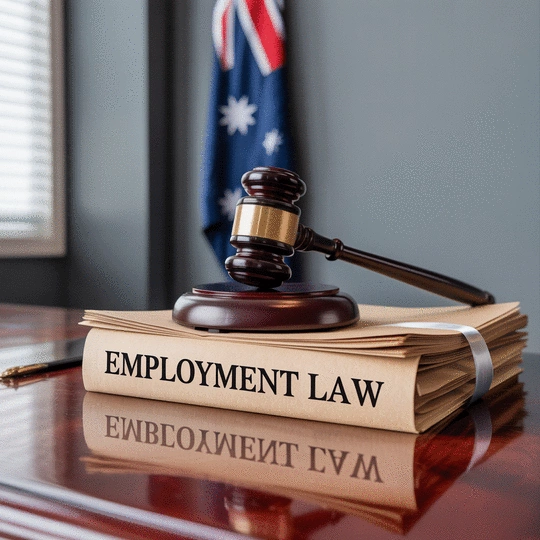Unfair Dismissal Claims in Australia

Posted on: 2025-10-27
By: Clara Thompson
As the landscape of employment law continues to evolve, understanding the nuances of unfair dismissal is more critical than ever for both employees and employers. Knowing what constitutes unfair dismissal can empower you to protect your rights or ensure your business adheres to legal standards.
What You Will Learn
- Unfair dismissal is characterized by harsh treatment, lack of procedural fairness, and inadequate reasons for termination.
- The Fair Work Act 2009 outlines eligibility and procedural requirements for unfair dismissal claims in Australia.
- Employees are entitled to a fair process, protection from discrimination, and the right to challenge their dismissal.
- Common reasons for unfair dismissal claims include inadequate warnings, sham redundancies, discrimination, and lack of due process.
- Statistical trends show a 15% increase in unfair dismissal claims, particularly affecting younger workers and high-risk industries like hospitality and retail.
- Successful unfair dismissal claims often involve lack of proper documentation, sham redundancies, or cases of discrimination.
- Legal remedies for unfair dismissal include reinstatement, compensation, and sometimes a formal apology from the employer.
- Employers can minimize the risk of unfair dismissal claims through clear documentation, effective communication of policies, and conducting exit interviews.
Trends in Unfair Dismissal Claims in Australia
Key statistics highlighting the trends in unfair dismissal claims across various industries.
Increase in Unfair Dismissal Claims
A reported 15% rise in unfair dismissal claims over the last year.
High-Risk Industries
Hospitality and retail continue to lead in the number of claims filed.
Employee Demographics
Younger workers, especially those under 25, are disproportionately represented in these claims.
Common Reasons for Claims
Includes poor performance without proper warning and discrimination.
Understanding Unfair Dismissal in Australia
Navigating the world of unfair dismissal can feel daunting for both employees and employers in Australia. As a legal expert passionate about simplifying employment law, I want to break down this complex issue into more digestible bits. Understanding what unfair dismissal means is the first step in asserting your rights or protecting your business from potential claims.
When we talk about unfair dismissal, it refers to situations where an employee is terminated from their job in a manner that is harsh, unjust, or unreasonable. It’s essential for both parties to grasp this concept as it can significantly impact workplace dynamics and legal obligations. So, how does one define unfair dismissal for employees and employers alike?
Defining Unfair Dismissal: What It Means for Employees and Employers
For employees, unfair dismissal is more than just losing a job; it's about the process that led to that termination. If an employee feels their dismissal was unjustified, they may have grounds to challenge it. On the flip side, employers need to be aware that dismissing an employee without following proper procedures can lead to significant legal repercussions.
Here are some key factors that define unfair dismissal in Australia:
- Harsh Treatment: The dismissal must be harsh in nature, considering the circumstances.
- Lack of Procedural Fairness: Employers must follow proper procedures when terminating employment.
- Inadequate Reasons: The reasons for dismissal must be valid and justifiable.
The Legal Framework Surrounding Unfair Dismissal Claims
The legal landscape for unfair dismissal is primarily governed by the Fair Work Act 2009. This legislation sets out the rules and guidelines that must be followed when terminating an employee. It’s crucial for both employers and employees to understand their rights and obligations under this framework.
Key elements in the legal framework include:
- Eligibility: Employees must meet specific criteria, such as having worked for a minimum period.
- Application Process: Unfair dismissal claims must be lodged within a certain timeframe.
- Fair Work Commission: This body handles unfair dismissal claims and aims to resolve disputes fairly.
Employee Rights and Workplace Rights in Unfair Dismissal Cases
Every employee has certain rights that protect them from unfair dismissal. It’s vital to understand these rights so that individuals can advocate for themselves effectively. Knowing what you are entitled to can empower you in difficult situations.
Here are some fundamental rights every employee should be aware of:
- Right to a Fair Process: Employees are entitled to a fair and reasonable process before being dismissed.
- Protection from Discrimination: Termination cannot occur based on race, gender, or other discriminatory factors.
- Right to Challenge Dismissal: Employees have the right to contest their dismissal through proper channels.
Common Reasons for Unfair Dismissal Claims in Australia
Now that we've explored the foundational aspects of unfair dismissal, let's look at some common reasons that lead to claims. Recognizing these factors can help both employees and employers navigate disputes more effectively. Here’s a closer look at the primary reasons:
- Poor performance without proper warning.
- Sham redundancy claims.
- Invalid dismissals due to lack of due process.
- Discrimination or harassment.
- Forced resignation.
- Accusations of misconduct.
- Breach of employment contracts.
Understanding these reasons can help foster a healthier workplace environment while ensuring that rights are upheld. If you're unsure about your situation or need further details on handling unfair dismissal, feel free to reach out—Employment Law Solutions is here to help!
Pro Tip
Did you know? Keeping detailed records of employee performance and feedback can significantly reduce the risk of unfair dismissal claims. Establishing a routine of regular performance reviews not only fosters open communication but also ensures that any dismissal is backed by documented evidence, which is crucial in legal disputes.
Case Studies and Statistical Insights on Unfair Dismissal Claims
Understanding the real-world implications of unfair dismissal can be enhanced by examining actual case studies and statistical data. These insights reveal patterns that can inform both employees and employers about common pitfalls and successful strategies. As we dive into this section, it's essential to recognize how the information can empower you to navigate the complexities of employment law effectively.
According to recent trends, unfair dismissal claims have been on the rise across Australia. This increase often correlates with economic fluctuations and changes in workplace policies. By analyzing these trends, we can identify specific industries and roles that are more susceptible to unfair dismissal cases, allowing both employers and employees to be more proactive in safeguarding their rights.
Analyzing Trends in Unfair Dismissal Claims Across Australia
Research shows that certain industries experience higher rates of unfair dismissal claims. For instance, sectors like hospitality, retail, and construction frequently report a significant number of claims. This often stems from the nature of employment contracts and the transient workforce in these fields. Here are some key trends worth noting:
- Increase in claims: A reported 15% rise in unfair dismissal claims over the last year.
- High-risk industries: Hospitality and retail continue to lead in the number of claims filed.
- Employee demographics: Younger workers, especially those under 25, are disproportionately represented in these claims.
These statistics serve as a wake-up call for employers, emphasizing the importance of clear communication and fair processes when managing staff. It’s vital for employers to stay informed on these trends to mitigate risks associated with unfair dismissal.
Real-life Examples: Outcomes of Successful Unfair Dismissal Claims
Examining real-life cases can provide valuable lessons for everyone involved in the employment landscape. Here are some noteworthy examples of successful unfair dismissal claims that can guide both employees and employers:
- Case 1: An employee in the retail sector successfully claimed unfair dismissal after being terminated without proper warnings or documentation.
- Case 2: A worker in the construction industry won their case due to sham redundancy, proving the employer had not genuinely made the role redundant.
- Case 3: An employee who faced discrimination successfully argued their dismissal was unfair, resulting in a significant compensation payout.
These cases highlight the importance of adhering to fair practices and proper documentation to avoid legal pitfalls. At Employment Law Solutions, we often remind our readers that knowledge is power, and understanding how these cases unfold can help prevent similar situations.
Legal Remedies and Compensation Claims for Unfair Dismissal
When unfair dismissal occurs, it's crucial for affected employees to know their rights and options for recourse. There are various legal remedies available, which can vary based on individual circumstances. Here’s a breakdown of common legal remedies and compensation claims:
- Reinstatement: Employees may be reinstated to their previous position if the dismissal is deemed unfair.
- Compensation: Financial compensation can be awarded based on loss of income and damages suffered due to the dismissal.
- Apology: In some cases, a formal apology from the employer may also be part of the resolution.
Understanding these remedies is vital for anyone facing unfair dismissal. They highlight the importance of seeking legal advice promptly, a principle we advocate at Employment Law Solutions. Remember, acting quickly can significantly influence the outcome of your case!
Frequently Asked Questions (FAQs)
- What constitutes unfair dismissal in Australia?
- Unfair dismissal typically refers to a termination that is harsh, unjust, or unreasonable. Key factors include harsh treatment, a lack of procedural fairness, and inadequate reasons for the dismissal.
- What is the Fair Work Act 2009, and how does it relate to unfair dismissal?
- The Fair Work Act 2009 is the primary legislation governing employment law in Australia. It sets out the rules and guidelines for terminating an employee, including eligibility criteria, application processes, and the role of the Fair Work Commission in resolving unfair dismissal claims.
- What rights do employees have in an unfair dismissal case?
- Employees have the right to a fair process before dismissal, protection from discrimination, and the right to challenge their dismissal through appropriate channels, such as the Fair Work Commission.
- What are some common reasons for unfair dismissal claims?
- Common reasons include poor performance without proper warnings, sham redundancies, invalid dismissals due to lack of due process, discrimination or harassment, forced resignation, accusations of misconduct, and breach of employment contracts.
- What are the potential legal remedies for a successful unfair dismissal claim?
- Legal remedies can include reinstatement to the previous position, financial compensation for lost income and damages, and in some cases, a formal apology from the employer.
- How can employers minimize the risk of unfair dismissal claims?
- Employers can reduce risk by documenting performance issues thoroughly, providing clear and accessible workplace policies, conducting regular performance reviews, and performing exit interviews to gather feedback.
Conclusion and Next Steps for Employees and Employers
As we wrap up this discussion, it's essential to reflect on what we’ve learned about unfair dismissal and the importance of understanding both the legal framework and practical implications. Whether you are an employee navigating this challenging situation or an employer striving to uphold fair practices, the insights shared here can assist you in making informed decisions.
Next, I encourage everyone to explore further resources, seek legal advice, and engage in discussions with colleagues. Together, we can foster responsible dismissal practices and build a workplace culture that protects the rights of all employees!
Understanding Your Options: Legal Advice and Support Resources
If you find yourself facing an unfair dismissal claim, it’s crucial to know where to turn for help. Here are some support resources you can consider:
- Fair Work Ombudsman: Provides guidance on your rights and obligations.
- Legal Aid: Offers free or low-cost legal advice in employment matters.
- Workplace Relations advisers: Can assist in understanding your employment rights.
Having access to the right resources can make all the difference in navigating your situation. For more detailed information on employment standards and protections, you can visit the U.S. Department of Labor's website. Remember, Employment Law Solutions is here to help empower you with the knowledge you need!
Encouraging Responsible Dismissal Practices in the Workplace
Lastly, promoting a culture of fair treatment and transparency in the workplace is essential for all employers. Here are some best practices to consider:
- Document performance issues: Keep detailed records of employee performance and any relevant communications.
- Provide clear policies: Ensure that workplace policies are well communicated and accessible to all employees.
- Conduct exit interviews: Gaining feedback from departing employees can help you improve future practices.
By committing to these practices, employers can minimize the risk of unfair dismissal claims and create a more harmonious workplace. It’s a win-win for everyone involved!
Recap of Key Points
Here is a quick recap of the important points discussed in the article:
- Understanding Unfair Dismissal: Unfair dismissal occurs when an employee is terminated in a way that is harsh, unjust, or unreasonable.
- Key Factors: Important factors defining unfair dismissal include harsh treatment, lack of procedural fairness, and inadequate reasons for dismissal.
- Legal Framework: Governed by the Fair Work Act 2009, it outlines employee eligibility, the application process, and the role of the Fair Work Commission.
- Employee Rights: Employees have the right to a fair process, protection from discrimination, and the ability to challenge their dismissal.
- Common Reasons for Claims: Factors like poor performance without warnings, sham redundancies, and discrimination often lead to unfair dismissal claims.
- Legal Remedies: Affected employees can seek reinstatement, financial compensation, or an apology when dismissed unfairly.
- Best Practices for Employers: Documenting performance issues, providing clear workplace policies, and conducting exit interviews can help minimize unfair dismissal claims.
 Understanding your rights in the workplace is not just beneficial; it's essential. With 1 in 5 Austr
Understanding your rights in the workplace is not just beneficial; it's essential. With 1 in 5 Austr
 Understanding unfair dismissal appeals can feel like navigating a maze. Did you know that nearly 20%
Understanding unfair dismissal appeals can feel like navigating a maze. Did you know that nearly 20%
 Contract compliance is more than just a legal obligation—it's a cornerstone of effective business
Contract compliance is more than just a legal obligation—it's a cornerstone of effective business
